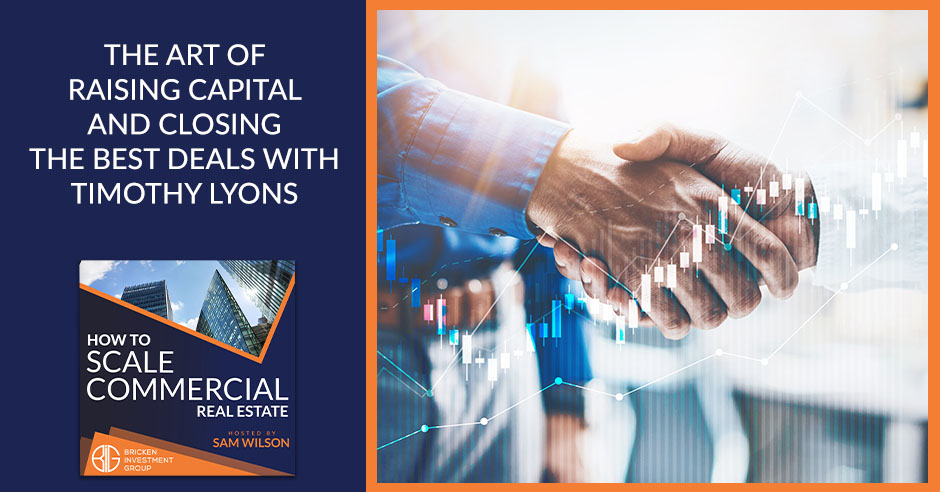Do we have what it takes to succeed in real estate? The key is to master the art of raising capital and closing the best deals. Repeat guest Tim Lyons emphasizes that we need our teams to do these. Tim is a 16-year veteran who had explosive growth in the multifamily sector in 12 to 18 months. In this episode, Tim discusses the importance and service that Cityside Capital provides to people looking to invest. Cityside helps people make the most out of their investments and help them decide on real estate investments, especially those who don’t know who to trust or where to start. Stay tuned to learn more!
—
Watch the episode here:
Listen to the podcast here:
The Art Of Raising Capital And Closing The Best Deals With Timothy Lyons
We’ve got our guest Tim Lyons here with us now. I don’t know what episode this will be, Tim. it’s somewhere in the 400 range, so it was a lot of fun.
That’s great. Congratulations.
Thanks, I appreciate it. It’s fun to have a repeat guest on the show. I’ve not had too many of those. Your episode 59 went live on January 27th of 2021. When this goes live, it will be January of 2022. For those of you that don’t know Tim, he’s a sixteen-year veteran in the New York City Fire Department. He also raises a heck of a lot of capital and has had this explosive growth in the multifamily sector here since 2020. Tim, welcome to the show.
Sam, it’s always a pleasure. Thanks for having me back.
Give us a quick rundown. By the time this goes live, it will be almost a year from show to show. Tell us what’s happened in the last twelve months in your business. What decisions have you made and maybe give us the breakdown as to why?
If you read the first episode, you know I was stuck in the W-2 grind as a New York City Firefighter and ER nurse. I’m working a ton. I have three little girls under the age of ten and something had to change. I was trading time for money. I wanted to get into real estate but I wasn’t sure how. I bought a three-family property, which we sold in 24 months and doubled our investment.
I’m trying to take advantage of the market a little bit, and free up some capital but I wanted to get it to multifamily. I needed to find out how. I went ahead and I got educated. Self-education is number one, but also, I went into a mentorship coaching program, and that collapsed the timeframe for me in a big way. I highly recommend everybody do that. With that being said, I was surrounded by a ton of great people and networking opportunities helped us grow. That was one thing.
Number two was putting in systems, working on our backend office stuff, automation, emails, content creation, being a guest on podcasts, and telling people what it was that I was doing along with my brother, Greg, who was my business partner. That was the biggest catalyst for us and to be more active on social media. Let’s be honest. A lot of people spend a lot of time trying to get to the bottom of their feeds on their phones.
Surround yourself with great people and networking opportunities that will help you grow.
By doing that, it went to a lot of organic conversations about what is it that you guys do? How can it help me? That’s where our unique selling proposition came about our value in Cityside Capital. When people have the capital to invest, they may not know where to go? Who to trust? How do you vet a deal and sponsor? What is syndication even? Even these highly educated people with a good amount of capital never heard of it or didn’t understand how it works. What we have been doing over the last twelve months is going all-in on education, having a ton of phone calls, letting people know what it is that we’re doing and how they can be involved?
I know you’ve taken some other steps that some people have not taken on the capital-raising side and I’d love to spend the bulk of this show if we can. We’re talking about your thinking around why you became a registered representative of a broker-dealer. I know there are some pros and some cons to that. Let’s jump right into that side of things. Tell us what it is first of all and then why did you do it.
It is a mouthful, registered representative of a broker-dealer. It sounds intimidating. Commercial real estate, multifamily real estate, and syndications are team sports. Greg and I had to find out what our value was to the team. In the beginning, when we partnered on our first three deals, we were newer. We weren’t going to be the boots on the ground because we didn’t live in the areas. We weren’t going to be the asset managers because we were brand new but we were able to align ourselves in these partnerships.
What we found was that we could raise some money. I think it’s a function of growing up in the New York City area and having our network the way it is. We were blessed that way. The problem is you can’t get paid to raise capital and keep on moving on to the next operator, next deal, and speed date your way to success.
It’s a felony, the SEC and the Feds will come after you because you have to have what’s called material participation in the general partnership. You have to be doing something. There are many ways to skin the cat, but Greg and I, once we figured out that capital raising was probably going to be our strong suit, we wanted to figure out how can we do that in the best way, the most illegal way, so that we can sleep at night. That’s what we did.
We ended up being connected with a multifamily syndication broker-dealer. There are not many of those out there, but it was almost too good to be true for Greg and me because it came at the right moment and it’s funny how those things work out. When we got connected, the process was we had to take three exams the Series 82, Series 63, and something called the Securities Industries Essential Exam, the SIE. Anybody can take the SIE.
The next two is you have to be sponsored by the broker-dealer to take those exams but once you have those exams and the 82 is all about direct participation in private placements, which is the definition of syndication. We were able to “sell securities” because we had these licenses. The value for us and our investors was that we were able to align ourselves with ten multifamily and self-storage syndicators that were experienced in their spaces.
They had gone full cycle on deals and had a whole system. Some of them are vertically integrated, so we were able to join them in their deals by bringing the equity in a way that we can be compensated for it. In the process, we’re able to maintain a position in the general partnership and get the equity on the back end, so it was a win-win situation. I’ll throw it back to you and see if you have any questions.

Best Deals: It gives a lot of people a sense of comfort and confidence and clarity that we are registered, have licenses that we are held to a higher standard than people that are raising capital.
Do you have to disclose to your investors that you are becoming part of the general partnership as well?
It’s in the subscription docs that if the lead operator may use a third-party company like ours helping platform to raise equity because they haven’t disclosed where the equity comes from. Whether it’s a 506(b) or (c), they have to disclose and they might be paying a commission to a company like ours. It’s all in there. I get a lot of questions. Why do operators go through somebody like you guys for equity? How come they don’t go to a big hedge fund, private equity, pref equity or family office.
The reason is that sometimes syndicators can lose autonomy in their deal. They work with a family office or pref equity group. Those types of entities sometimes want to come in as a JV. They don’t want to come in as a limited partner. If they’re coming into the JV, they want to have some voting rights and some responsibilities. They want to maybe a 2-year or 3-year lockout period where you can refi them out. Our value is that we bring investors to the table and we don’t require any of those hurdles.
That makes a heck of a lot of sense from the general partnership raising capital side. I’m not saying you’re not in real estate. Clearly, you’re in real estate, but it’s almost like you’re shifting the business model somewhat in the sense that our trajectory is to go, “We’re going to go buy more assets and buy more actual real estate.” Is it moving for you or does the business objective somehow change where now it’s, “We’re not going to go buy a real estate, we’re going to raise capital?” Does that question even make sense?
I think it falls back to the team sport mentality. Coming into this business, we didn’t have that. We wanted to do everything ourselves. We want it to underwrite, get the property in the contract, run the property, pick out our own property management company, and do all the things. When we realized the power of syndication and aligning ourselves with great operators, I think we made that pivot to what’s our superpower.
Now we can collect real estate, these large 100, 200 to 300-unit deals and we get to do what we love best, which is talk to investors, raise capital, keep them informed, answer questions, what for new deals, underwrite new deals. It’s something that suits us the way we are. Greg and I are still W-2 workers. I still work in the firehouse and Greg still works in the health and fitness industry. Although I keep on trying to get them to go all-in on city side capital we’ll see what happens.
Some more nuanced questions for you. What are the costs? You guys are working for a broker-dealer. They have some fences for maintaining that broker-dealer status. Any idea what that is? That’s the first question and the second question is, let’s say you go out and you raise $5 million for a deal. How much of your cut for raising that money goes to the broker-dealer?
There’s a cost of capital for the operators that we work with. There’s a standard type of fee. It’s called 3% of capital raised. That would be the commission for the registered reps and then there’s a split with a broker-dealer. That’s upfront. That’s your acquisition fee. We just got a call it a commission. The equity on the backend is formula-based, based upon the capital place, which will be your equity in the deal on the backend.
Commercial real estate, multifamily real estate, and syndications are a team sport.
What about the splits that you have? Maybe you can speak in more general terms. We’ll use the $5 million example. If you raised $5 million, you get $150,000 in commission. Is it 80/20, 70/30, or 50/50? I’m asking for anybody that’s considering this. How do they have to think about this long-term, and what’s the split between you and your broker-dealer?
I can only talk about what we’re doing and it’s 80/20. I think that’s pretty fair and probably pretty standard across the broker-dealers across the country. Call it 3% of capital place and then you get 80% of that 20% going into the broker-dealer. It’s the same thing on the backend, 80/20.
The follow-up question to that is, do you have any idea what it costs to maintain that broker-dealer status because I know that’s not an inexpensive thing for your multifamily broker-dealer to hold? Do you have any idea what it is on that front?
I don’t know. It probably has to do with how many deals you’re doing per year. How many registered reps are in your business? For our broker-dealer, we have 18 or 19 groups like Cityside Capital that are working with this one broker-dealer. It’s a pretty large operation. We have a third-party underwriter, a due diligence firm, and a legal firm that’s retained by us for our operations. There are a lot of backend costs. Also, depending on where your investors live, you have to be registered in each one of those states. You could do a blanket 50-state registration every year, or you have to be dialed in to where are you raising capital from. You have to be paying those fees to those states to maintain your registration.
That’s the beauty of being tied to a broker-dealer because you don’t have to think about it. I’m not trying to dial in or justify what expenses you have to pay to a broker-dealer, but there is a lot that’s offered there on that side of it. That allows you to go out and raise money as opposed to thinking about more of the mechanics of how this is done.
I love what you’ve said so far about why you are staying within the bounds of compliance and allowing you to sleep at night. It gives you a chance to raise money for a bunch of deals. How have your investors responded to you becoming a registered rep and also to presenting more of a suite of sponsors as opposed to deals from Tim and Greg? What’s that conversation been like and how have you shifted that?
It gives a lot of people a sense of comfort, confidence, and clarity that we are registered, have licenses, and are held to a higher standard than most people that are raising capital for whatever type of investment vehicle out there. It’s a great conversation to have and as we grew in our business, we invested it heavily in Cityside Capital. People appreciate that we have our own portals.
Now they can go to one portal and see 10 operators and 10 deals instead of remembering your login credentials for ten different portals. We have a non-stop deal flow. We don’t do every deal that comes across for whatever reason, but we have the opportunity to present a lot of deals to our investors to show them what are the good deals out there.

Best Deals: Don’t do it yourself when it comes to real estate. Make sure you have got a good team around you.
We have all these resources at our disposal that we do talk about with our investors. A deal that comes to us from an operator is already underwritten and quoted on the property. The due diligence is already done. Earnest money is already on the line. When we get the deal, we also go through a second due diligence period where we have our underwriters go through the deal and they give us a report.
Our lead broker-dealers. We have two of them. They’ll fly out to the property, go walk the property, get a sense of it and do a site report. We have a due diligence firm called CrowdCheck that makes sure that all the documents and LLC are set up correctly. By the time the deal comes to our investors, it’s been doubly vetted. They can be sure that there was a ton of due diligence done before we presented it to them.
The next question would be timing right now getting especially in the multifamily sector. Getting deals done in a timely fashion is extremely attractive to sellers. With those additional due diligence steps, it adds more time before you can go back to the sponsor and say, “Mr. Sponsor, we can bring $10 million to the table or whatever it is.” How much delay does it take for that secondary layer of due diligence to get done? Has that negatively impacted your ability to move forward on the capital-raised side?
We generally need 4 to 7 days of runway before the sponsor is going to go live with their deal. What happens usually is that the sponsors give us a heads up. The list us to have to deal with the contract. Here’s what we’re looking at and we have a pretty good idea of what’s in the pipeline. We’re able to tell them based on the deal and investors. We have a lot of internal conversations. What allocation do you think that we can come up with that our investors have an appetite for and those kinds of questions?
By the time the deal comes to us, we’re pretty much dialed in. The operators, there’s a whole onboarding process for them. They’re forking over a due diligence fee so that we can underwrite them, go through their due diligence and all their past deals. We fly out to their properties. By the time everything comes together, everybody is comfortable with the operators and their deals.
I love your thinking there and I appreciate you breaking down some of the more nuanced mechanics of why you have done what you’ve done and how some of this functions, Tim. This is great. I love to see the explosive growth you guys have had over 2021. If you were to have an amazing 2022, what would it look like for you?
I never thought I could think like this, but the sky is the limit. There is a lot of capital out there that’s looking to get into real estate. I’m open to get to $20 million raised in the first half of the year if possible. We started our own podcast called the Passive Income Brothers Podcast. I’m looking forward to following in your footsteps and getting on the podcast circuit. So far, so good. That’s where we’re looking for 2022.
Tim, that’s fantastic. I love the vision, especially what you said there is you could dream this big, but the sky is the limit. You’re walking proof of it. I’m sure at the firehouse, guys are asking you all the time like, “Tim, what are you doing? How in the world are you doing it?” There’s got to be a little bit of pride that goes into all that like, “If I can do it, anybody can do it.” I love seeing people chase their dreams and making it happen. Let’s jump here into the final four questions. The first question is, what is one tool or resource you find you can’t live without?
The sky’s the limit. There’s a lot of capital out there that’s looking to get into real estate.
It is my online calendar. I was always a paper and pen guy. What I found was there are so many moving parts between Calendly dealings, calls, and everything.
Question number two, if you could help our readers avoid one mistake in real estate, what would it be and how would you avoid it?
Don’t do it yourself. Make sure you got a good team around you, especially the most important piece is the property manager. Make sure you’ve got good property management in your company that can perform. They have systems in place and support them the whole way through.
When it comes to investing in the world, what’s one thing you’re doing right now to make the world a better place?
Top of this investing for our own family. I love seeing the growth of these properties that we are involved. We take older units, we’re renovating them, making them nicer, and cleaning up neighborhoods. I do enjoy watching the before and after.
Tim, if our readers want to get in touch with you and learn more about your Cityside Capital, what is the best way to do that?
You can check out our podcast, the Passive Income Brothers Podcast, or come to our website CitysideCap.com.
Thank you, Tim. I appreciate your time. This was great.
Likewise.
Important Links:
- Tim Lyons
- Episode 59 – Past episode
- CrowdCheck
- Passive Income Brothers Podcast
- https://www.Linkedin.com/in/Tim-Lyons-Cityside-Capital/
- https://www.Facebook.com/Tim.Lyons.712/
- https://www.Facebook.com/CitysideCap
- https://Bit.Ly/Bringing-Value-Book
About Timothy Lyons

Tim is a 15 year veteran of the New York City Fire Department (FDNY) and currently serves as a lieutenant in the borough of Queens. Until recently, he also worked part-time as an emergency room RN at a level 1 trauma center. He brings years of real world management and leadership experience to his real estate investment career.
Tim’s initial goal with real estate was to create passive income and in turn, be able to spend more time with his wife and three little girls. After partnering on a multifamily property he saw first-hand the power of real estate investing as an opportunity to create passive income and build wealth for his family.
He started Cityside Capital with the goal of not only growing his own portfolio but also to help others realize the power that real estate investing can have on creating passive income and building wealth.
Cityside Capital has $45 million of assets under management including 335 multifamily units. Tim has also invested as a limited partner in 256 multifamily units in Texas and in a large retail super center in Tennessee.
He graduated from Providence College in 2005 and can often be spotted in the crowd when the Friars play in Madison Square Garden in New York City.




0 Comments